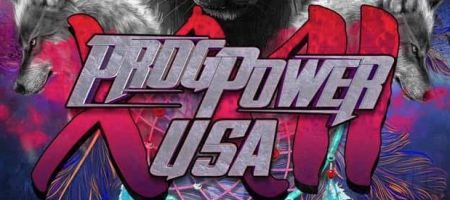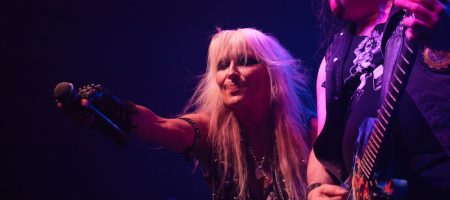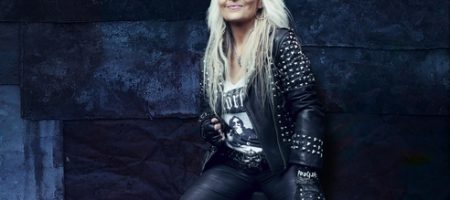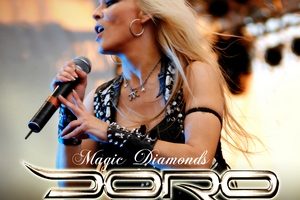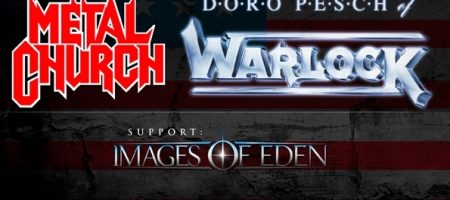Doro – We Are All We Need
Thursday, 9th September 2021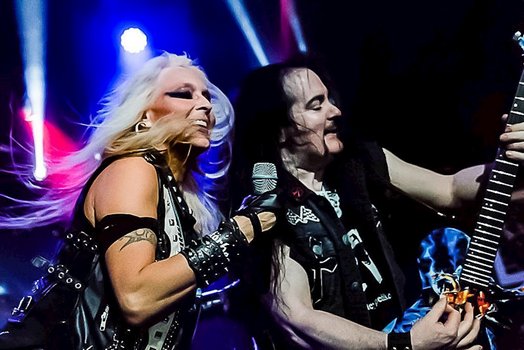
Delivering melodic heavy metal material since the early 1980’s, Doro Pesch has been through the ups and downs, trials and tribulations of this genre we all hold near and dear to our hearts. Celebrating the 35th anniversary of the Warlock album Triumph and Agony, we have a new live album that captures this record live at the Sweden Rock Festival in front of tens of thousands of passionate fans. We reached out to the German veteran by phone and she was happy to bring the readers up to speed on her memories surrounding the record, live touring/festivals, favorite fan interaction stories, and what the future holds.
Dead Rhetoric: The new live album Triumph and Agony Live celebrates the 35th anniversary of the record – recorded at the Sweden Rock Festival. What memories do you have surrounding this specific show and how does it feel to revisit such an iconic record in your career?
Doro Pesch: I love that record. It is one of my favorite records. We started celebrating it during the 30th anniversary, we did some live shows in Spain, tours in America, festivals like Sweden Rock, Norway, Graspop festival. We knew that we couldn’t go on tour, we were checking out all this material, and Sweden Rock looked and sounded so great. So the CD is a combination between Spain and Sweden Rock, and the Blu-Ray that has the whole Sweden Rock show, and a documentary that is about 90 minutes, that came out really good.
It made me feel really good, there are some songs that we never played live before “Make Time for Love” and “Kiss of Death”. The full album brought back so many memories when things were so huge in the 1980’s. We could hop on tour in 1988 with Ronnie James Dio in Europe, and in America it was Megadeth. The touring experiences were so awesome. “All We Are” became a big hit, which we didn’t expect. Ever since then we have played that song at every single show, it was a joy to bring it out again and celebrate with the fans. The audience and fans singing along provides a greater atmosphere, it came out really good.
Dead Rhetoric: You decided to switch the order up of the album performance live, was that because of the strength of the song “All We Are” has to be performed last instead of the first slot it has on the original record?
Pesch: Yes. We have always played it as the last song. Opening up with “All We Are” is almost impossible, where do you go from there? The biggest song and the biggest anthem. I think it was better to have that at the end and start the set out with “Touch of Evil”, then you can build and build to “All We Are”. When we play the songs live, we feel things out to see what should be in what place, which should be in the middle. “All We Are” became the hit, and it is a big anthem worldwide. Everybody seems happy, empowered, singing their hearts out.
Dead Rhetoric: What do you think made that time period and the songwriting so magical at that point during the 1980’s?
Pesch: The time was exciting. We had Headbangers Ball and all these videos, all these metal magazines around the world which I miss so very much. It was the big time. Nobody had any idea that grunge music would take over in the 1990’s. The time was good, the world was in better shape than it is now I would say. All the hair metal bands, everyone was having fun, everyone was dressing up, you could put on a big show. The music in the 80’s, great videos, great production – it was a wild time. We didn’t know it at that time but looking back the budgets were very big. I remember when we did our “All We Are” video, and the director was taking things in – we did the video in parts of the Los Angeles River basin, where the Terminator 2 had things shot with Arnold Schwarzenegger and the motorcycle. We had 150 people running around, we thought it was like a Steven Spielberg movie. All the venues filled with metalheads, all the festivals filled up, it was a great time.
Dead Rhetoric: You’ve also had the opportunity to do a lot of special guest vocal appearances over the last few years – including work with Amon Amarth, Angra, Powerwolf, and Tarja. Which ones impressed you the most, and how does it feel to be able to spread your talent through so many different artists in these various styles of metal?
Pesch: It was a total treat and a total honor to have these people on those records. They all have great vibes, and the best part is we’ve always stayed friends even after working together for a lifetime. People like Peter Steele, who is unfortunately not with us, that was great. I was friends with Lemmy, he did two songs with us on the Call of the Wild album. When he wrote songs for me, tears were running down my cheeks. Lemmy was very true. Another duet I did that was very cool was with Udo Dirkschneider, ex-Accept singer. I always wanted to do something with him, but the record companies and the management companies were making it impossible. It was always impossible, and we were finally free to do what we wanted, and that was great too. I miss Lemmy every day, he was my best friend. I would have loved to do a duet with Ronnie James Dio, we were able to tour together and sing live together on tour. In the encores he would ask me to sing them together, but we never recorded a song together in the studio.
Dead Rhetoric: How do you feel your voice has developed and/or changed over the decades? Are there different tricks of the trade you use to keep things primed and in shape between the studio work and the stage?
Pesch: Singing in the studio and touring as much as we can, keeps the pipes in good shape. No tricks, I just do it. It just comes out, the voice is always there, when I see the fans, the voice is always there. Live my voice is much more powerful than in the studio. I need the fans and their vibe and energy, the excitement helps me the most.
Dead Rhetoric: Is your approach different playing in clubs in front of hundreds of people versus the massive festival audiences where you can perform for tens of thousands?
Pesch: No, every show I treat things like it could be the last show. I never hold back, even in the smallest clubs where there are only a few hundred people, singing along and sweating with me. I am very happy when I play big festivals though like Wacken, it doesn’t make a difference though. All shows are important and great, as long as there are people there who appreciate the music and they are ready to rock. It’s nice to play big festivals as you get to see other bands, be with other friends and musicians, you get the chance to feel like you are around your friends. The smaller shows, there is an intimacy where you can talk directly to them, before and after a show. Hanging out with the fans.
Dead Rhetoric: Do you believe people will treasure and savor live concerts more since they haven’t happened for so long due to COVID-19?
Pesch: Well we just played in Belgium at the Alcatraz Festival, and the people were so hungry and on fire for live music. All the bands, fans, crew, appreciated it. There was nothing like it. It’s so wonderful, everybody was so happy. When you don’t have it for a long time and you really know, oh my God, it’s something that I miss so much. I didn’t want to get depressed by it, I love touring so much. Everybody feels the same way as well.
Dead Rhetoric: What are your thoughts on the heavy metal genre and community in today’s marketplace? Where do you think you’ve seen the biggest changes compared to the heydays of the 1980’s and 90’s?
Pesch: I really think in the 1990’s, everybody thought things would be bigger and bigger, better and better, but grunge took over. Not many rock and metal bands were able to survive. Now we have so many great big heavy metal festivals all across the world, big package tours that are going on. It’s going very well. What I really miss though is all the heavy metal magazines. Looking through the pictures, reading the stories. I hope that would come back, but I doubt it.
Dead Rhetoric: I agree with your thoughts on missing the magazine era – being fifty, that’s what I grew up around. Nothing against the internet, but reading about your favorite artists in print, seeing the pictures, posting things on your walls to have permanently with you is different.
Pesch: Absolutely. We have vinyl coming out for this new live album with the bigger picture, we have a box set, buttons, pictures, all that stuff that we used to love that you could put up in your living room to look at. All the magazines and all the photographers, they used to make such great photo sessions. Mark Weiss, he was in the New York/ New Jersey area, he was always doing these special sessions where you felt like you were shooting at a big movie. They are no more. I collected all those magazines from the 80’s that wrote articles about us. I have lost some of that from the two hurricanes, but I still have some stuff left.
Dead Rhetoric: What are some of your more memorable fan interaction stories you’ve heard regarding your body of work and songs?
Pesch: This past Sunday in Belgium at that festival, there was a little girl coming up on stage. She had a metal t-shirt on, she wanted to sing on “All We Are”. She crawled up on the stage, past the security people. She was so fast, ran on stage and belted that into the microphone. She was maybe six or seven years old. She told me she wants to become a drummer as well. I told her to go for it. It’s so great to see the younger generation becoming metalheads. It’s so exciting to see, people getting so inspired. I love when people discover my new album and they ask if I have more records out. I tell them they are in for many, many thousands of hours because we have twenty plus records out. It’s so important to talk about the older idols, all that good stuff. We talk about Wacken, the great metal festival in Germany.
One time I talked to fans who came to Wacken from Australia and they wanted us to play there. We had no connection to any promoters, the guy said he would do it. From there we were able to make a whole Australian tour, it was awesome. We met in this one guy’s house, his parents made space for the band to stay. That was so metal. You feel immediately connected and you become friends for a lifetime. I appreciate it big time.
Dead Rhetoric: Since your start as Beast as a teenager, did you always have the support of your family when it came to your musical career?
Pesch: Yes. My dad loved music and I grew up with my dad being a truck driver. We were always listening to music, and so loud. He had a big sound system. When I started my first band, they didn’t understand that it had to be metal. Later on, he came to the concerts, sometimes he would drive the band and the equipment to the shows. My dad and my mom, they supported me a lot. At first they didn’t understand that the sound had to be so aggressive. It’s metal, the guitars are loud. The whole band would hang out at my place, they enjoyed taking care of them and driving us around. They found out the guys were very nice, even if they looked scary with the bullet belts, long hair, piercings. They understood what metal was all about.
Dead Rhetoric: Do people ever ask you for advice about music or the business, and if so what do you talk to them about?
Pesch: Yes, sometimes after a show. They have seen a show, and they would love to pick up a guitar, start a band, what do I think, how would I do it? I tell them to follow their heart, do what you do best. Never ever give up, even when it’s hard. Things always go up and down. Try to find good people who will be willing to support you. Nobody can believe in you more if you just believe in yourself, full force. Just go for it.
Dead Rhetoric: Has your definition of success changed from the start of your career to your current outlook?
Pesch: Not really. I always wanted to do music. I wanted to always make the fans happy, that’s been my most important mission. It’s the same way. I don’t care about record sales, every song is special, and I love my songs. Some songs become hits, but maybe much later, twenty years later somebody discovers something. As long as you are happy with the songs, I always feel like I am happy with everything. I get excited and happy about it, the fans feel the same.
Dead Rhetoric: What is next on the agenda for Doro Pesch over the next year or so? Would you ever think about developing your own autobiography book on your life – and what do you think is left for you to accomplish as a musician?
Pesch: I started a book one time. I had to stop it, it got to me. It was not always great. There was a lot of triumph and a lot of agony. I want to concentrate on great songs, great records, tours, look ahead. Maybe in a few years I would write a book. I want to go on as long as I can making records, nice songs, going all over the world. Maybe go on a great package tour in North America. I’m hoping that everything is opening up more and more.












